Last Updated: September 28, 2024
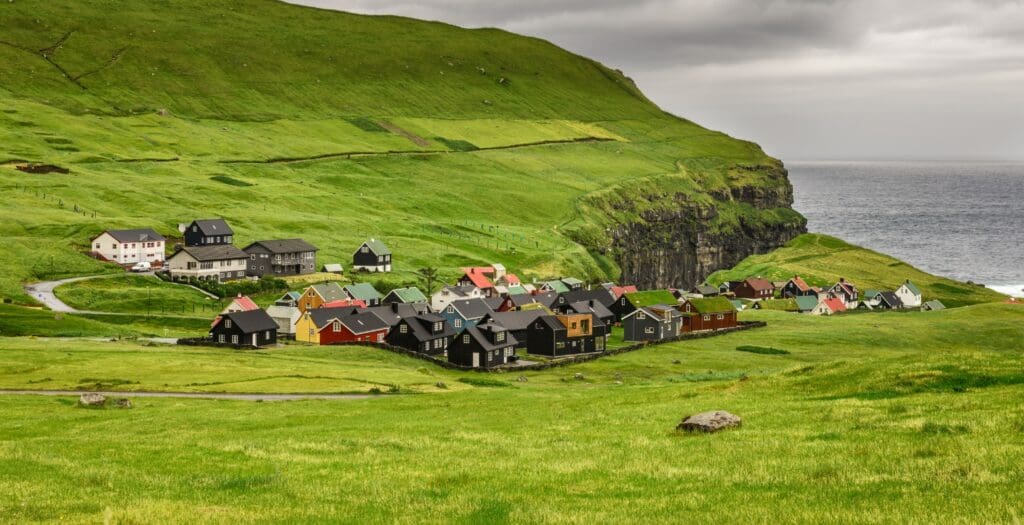
Faroe Islands is one of the most unique holiday destinations that beckons retirement travelers with its pristine nature. When we discovered for ourselves this small group of 18 islands, it lived in our minds rent-free for a while, so we had to find a way to work it into our world trip. The perfect window presented itself when we placed Ireland, North Ireland, and Scotland on our itinerary. Since the Faroe Islands are located in the North Atlantic Ocean between Scotland and Iceland, they were the ideal continuation for our Scotland road trip and make a great destination for retirement travel. Torshavn made a great central location to explore these beautiful islands.


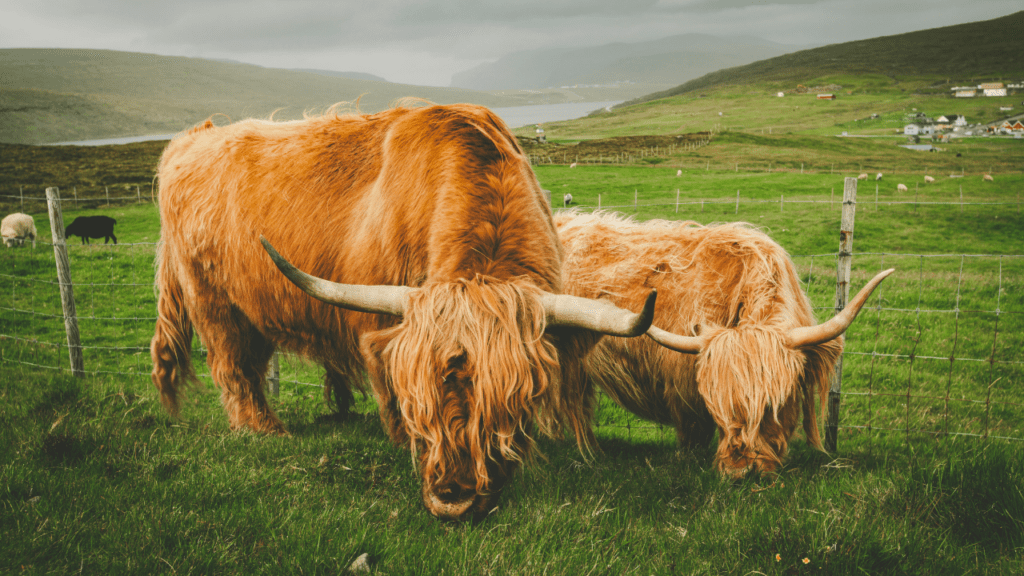
Isolated from the world and completely wild, Faroe Islands are an unusual holiday destination. Even the houses are built to blend with their surroundings thanks to the unique technique of lining the roofs with grass! Standing inconspicuously against the landscape, this genius architecture trick – an ancient Viking tradition – is the perfect substitute for the lack of trees and building materials on the islands.
Upon arrival at the Faroe Islands Vagar Airport, we spent a night in one such turf house before renting a car and setting off on our adventure to explore Faroe Islands attractions. This home was near the airport and we used Booking.com to book it.
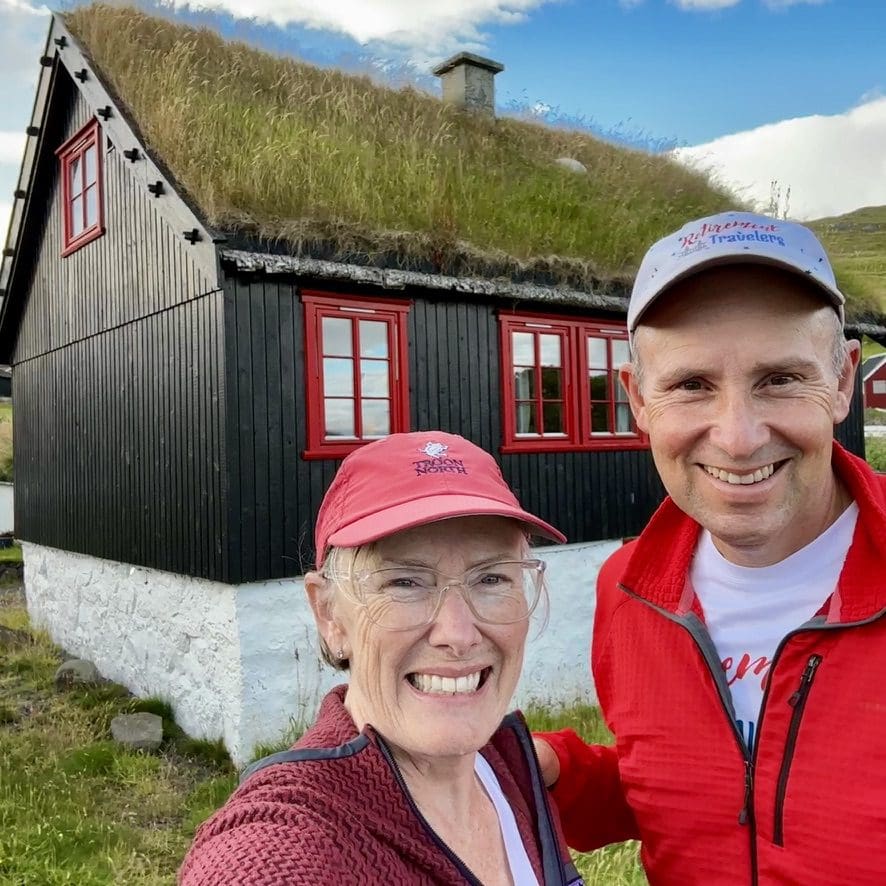
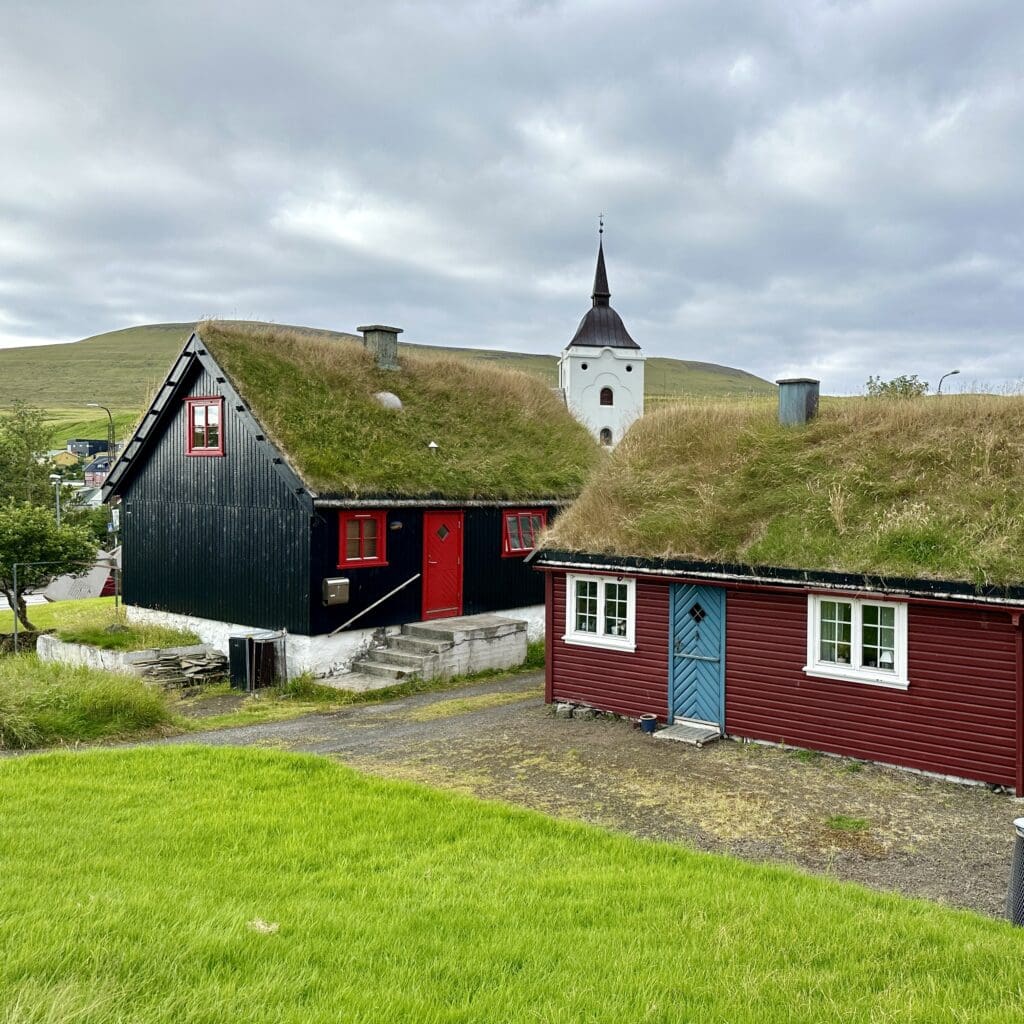
Nature’s creations are the main attractions on the Faroe Islands, with the rare advantage of enjoying them in near solitude. Prepare yourself for the most dramatic scenery you can imagine with waterfalls on tap that could give Iceland a run for its money. Unobstructed views, zero queues, and tourist crowds. If you are a nature lover, hiking junkie and prefer off the beaten path destinations, this Faroe Islands travel guide is for you.
Things to Know Before You Go
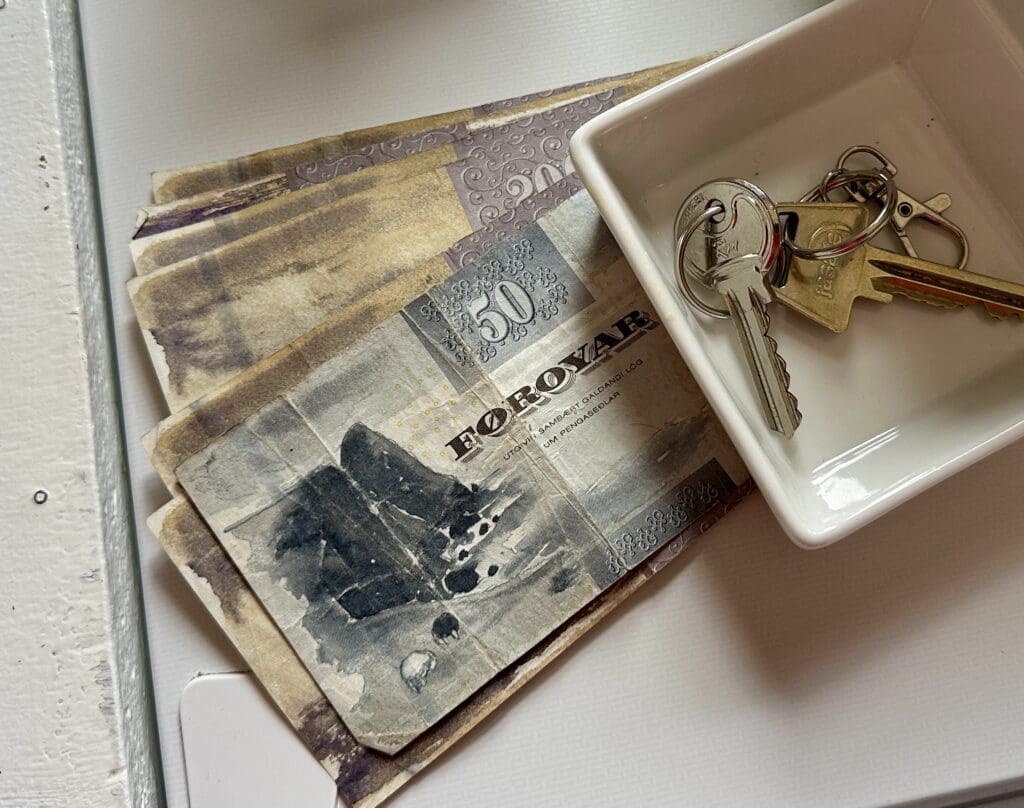
Faroe Islands Weather
But first, there are a few things you should know before you go. The Faroe Islands weather is as moody as the scenery. It can change with moments of notice, so prepare for strong winds, rain, and sunshine all in one day, and wear appropriate hiking shoes to account for muddy and slippery terrain. Also, keep in mind that tours may be canceled due to bad weather. Summer months are the warmest on the Faroe Islands, averaging a maximum temperature of 52F to 55F. One other perk of visiting during the summer months is the extra hours of daylight that allow more time to explore.
Faroe Islands Hiking
Hiking in the Faroe Islands is a popular activity, but note that some trails are located on private land where owners charge a fee, so do allocate a budget for hiking fees, some of which come in a little steep. Prices will range from $11 all the way to $70. But a visit to the Faroe Islands is a bucket list and a once in a lifetime type of journey, in our opinion, and should be planned out accordingly.
Faroe Islands Car Rental
Renting a car to explore the Faroe Islands is essential to allow you the freedom you’ll need. The biggest hazard to watch out for is the sheep, which apparently outnumber the people living on the islands. The islands are conveniently connected by tunnels and ferries and the roads are well-maintained. Upon arrival, visit a tourist center to pick up a Buttercup Route map named after the national flower. These are tourist roads that are separated from the main traffic and pretty much guarantee stunning views. How organized!
Faroe Islands Hotels – Where to Stay
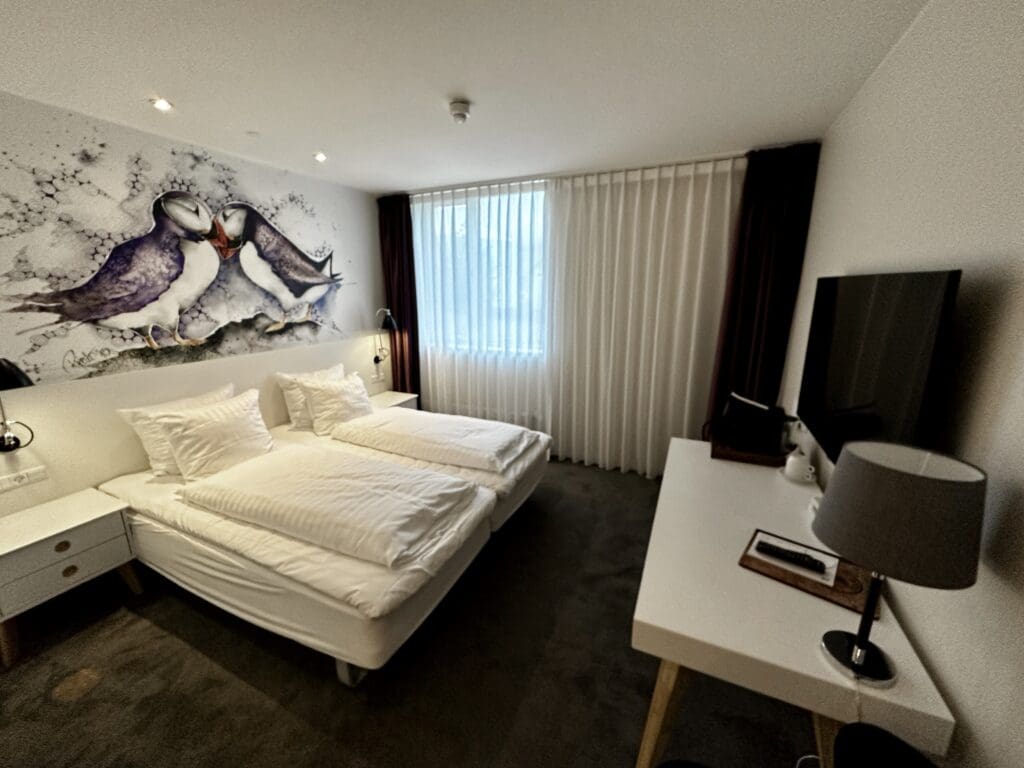
Faroe Islands is an 18-island archipelago with many attractions spread out across the lot. But if you are wondering which of the Faroe Islands to base yourself on, the answer is simple – Torshavn. Torshavn is the capital and the largest city offering the most accommodation on the Faroe Islands. It’s also the best place to stay if you enjoy having many dining options and conveniences at arm’s reach. On top of that, all of the must-visit Faroe Islands attractions are located in the two hours driving radius of Torshavn. So after one night on Vagar Island, we headed to the capital and based ourselves in Hafnia Hotel for 8 nights.
Faroe Islands Things to Do
Vagar Island
Vagar Island is one of the biggest western islands with an international airport. It is also one of the Faroe Islands where places to visit are in surplus. And that is where our Faroe Island adventure began.
Out of all the top Faroe Islands places to visit, the ones located in Vagar are easily accessible. Start your day with a swift drive from the airport to Gasadalur village, the gateway to some of the most photographed spots on the Faroe Islands. Next to the village, hanging off rugged cliffs is the famous Mulafossur waterfall that drops right into the ocean below.
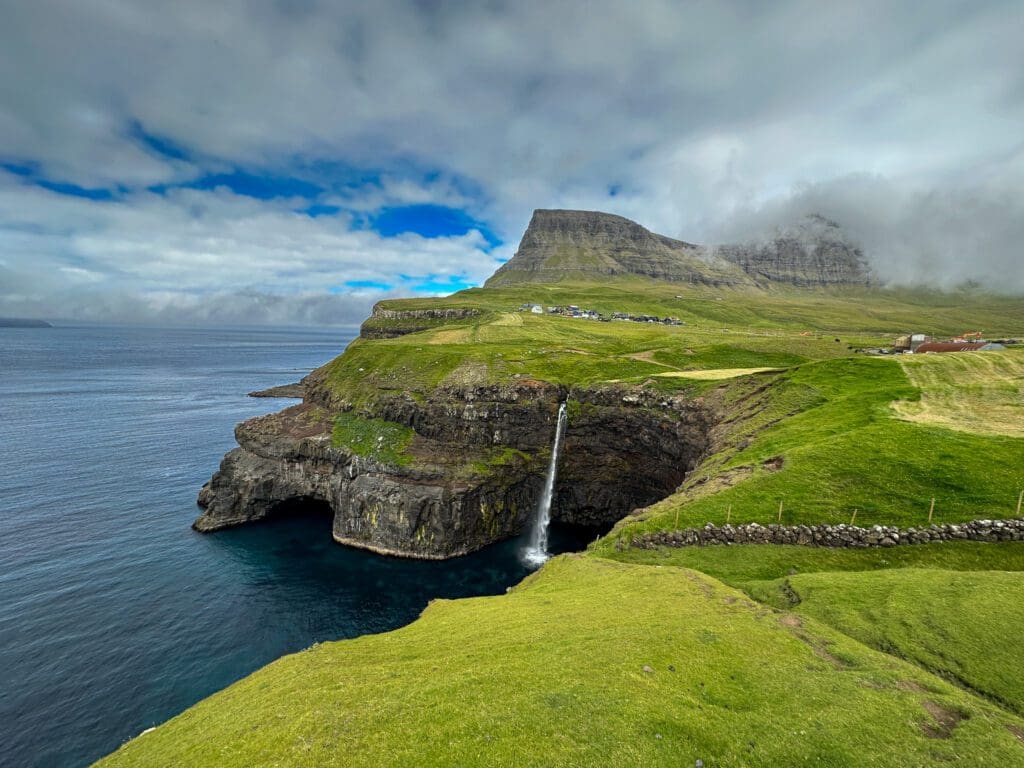
Another incredibly scenic spot close to the airport is Dunnesdrangar – two giant stone stacks divided from the rugged cliffs, towering above the sea below and waves crashing all around them. Though getting there is not as easy as driving up and will require a bit of hiking, the views are worth the effort.
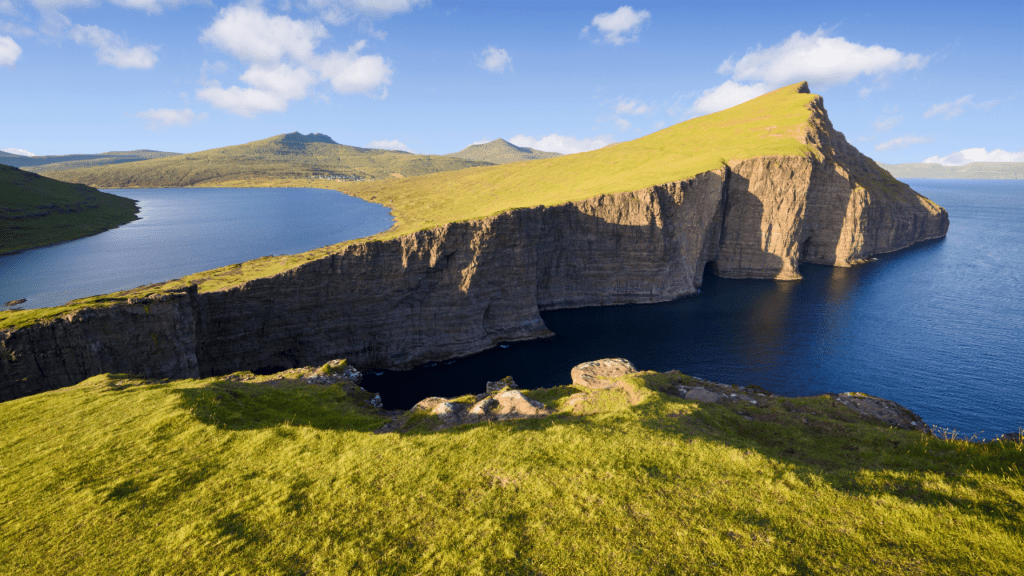
Vagar Island is also home to some incredibly picturesque lakes, but the one that takes the win is Sorvagsvatn Lake. It is a giant body of water that looks like it’s hovering above the ocean at the edge of the cliffs. We recommend taking the hike to Slave Cliff. You will see the most impressive angles of the lake and the waterfall that drops into the ocean at the tip. Though the view is breathtaking, Slave Cliff has a somber story. It gets its name from Vikings executing their slaves by pushing them off the cliff. But we are certain that the next spot will cheer you right up!
Mykines Island
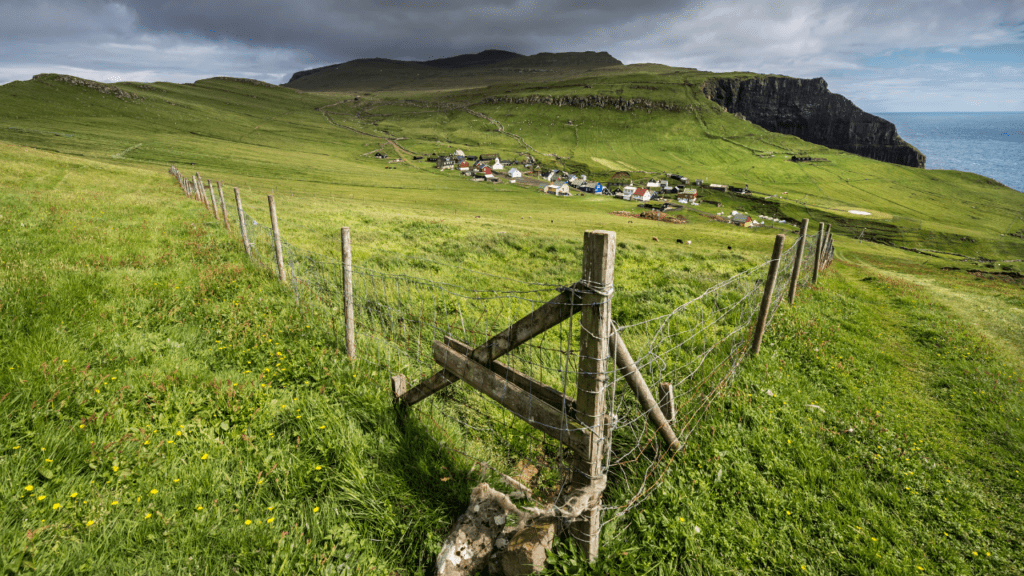
The other reason to come to Vagar Island is that it’s a jumping point to Mykines Island. It is more popularly known as puffin island. In the summer, Mykines becomes a breeding ground for hundreds of thousands of puffins. It makes the trip there an incredibly fruitful and entertaining birdwatching excursion. You can get there by helicopter or ferry, which departs from Sorvagur. Be prepared in case your transportation gets canceled due to bad weather. It will be utterly disappointing since visiting Mykines is one of the best things to do in the Faroe Islands.

If the weather pans out in your favor, make sure your transport is booked in advance and budget an entire day for your trip to Mykines Island. The journey each way will take around one hour, and you will need at least two hours to explore the hiking trails and take hundreds of photos of puffins, the stunning cliffs, and those iconic lighthouse snaps.
Streymoy Island


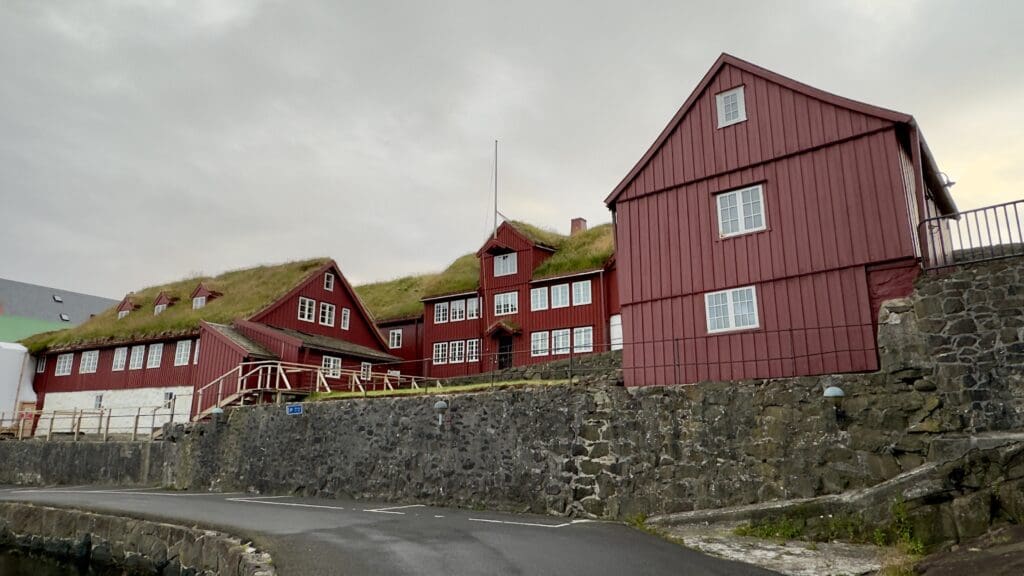
Faroe Islands Torshavn
Next on our Faroe Island itinerary was Streymoy Island, the largest of them all and home to Torshavn, the capital of the Faroes. That is where we based ourselves and enjoyed its charms when we were not exploring the surrounding islands. Torshavn is a port city beautifully decorated with colorful houses, street art, and picturesque boats that line the harbor.
[Check out our Guide to Torshavn for more exciting things to do in the Faroese capital]
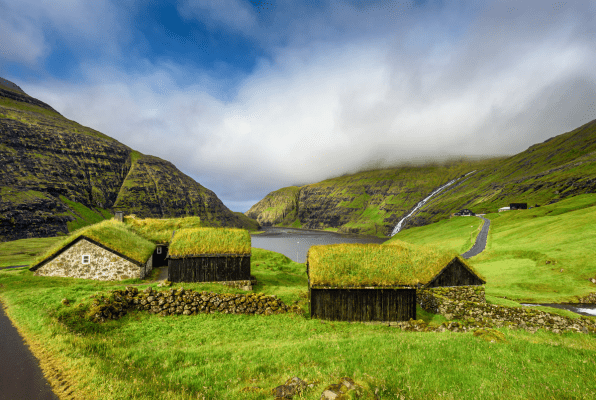
Visit Saksun Village
From Torshavn, we headed north to explore the rest of Streymoy Island, starting with Saksun village, which is a bit challenging to get to, but visiting this place gives you a bit of an insight into the local Faroese life and their preference for isolation. The village is tiny but spread out and postcard-worthy; surrounded by vast expanses of hills, dramatic mountains, and waterfalls cascading off them from all sides.
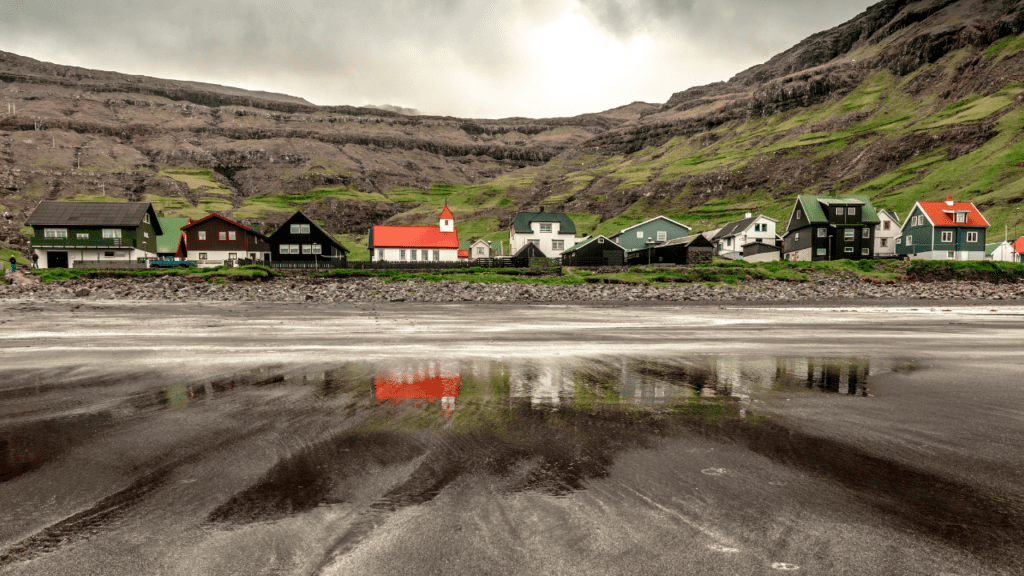
After taking in the scenery of Saksun, you’ll make your way further up north to Tjornuvik village, another unique place to visit in the Faroe Islands. Along the way, you’ll spot Fossa waterfall, the tallest waterfall, before finally reaching this northernmost slice of serenity. Tjornuvik is a tiny village with a very ocean-loving population and a lively surfing scene.
If you don’t want to brave the cold water, we recommend embarking on one of the best hikes in the Faroe Islands to Mylingur Peak. It’s also one of the hardest for the lack of trail markers. Make sure you have a map, and it’s not foggy so you can stay on the trail.
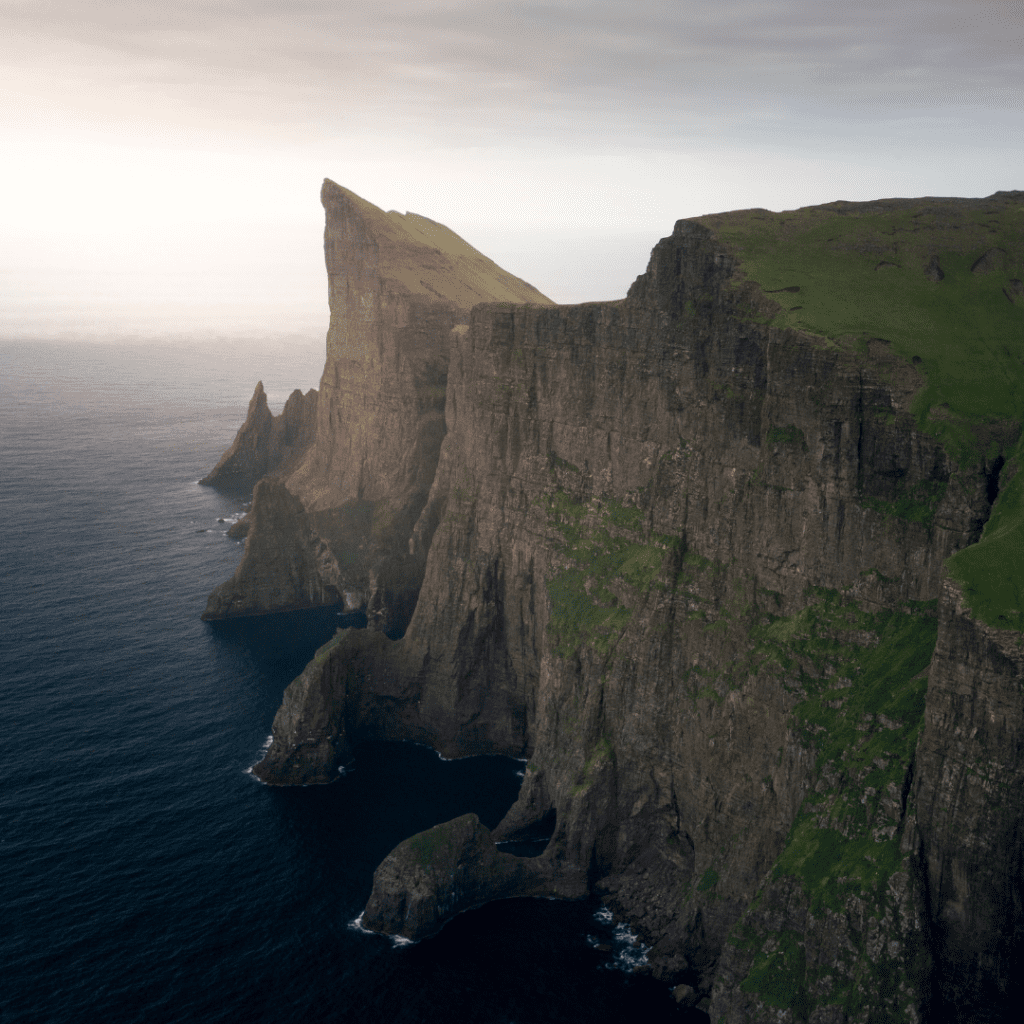
One of the most popular things to do in the Faroe Islands is to take a boat trip to the Vestmanna cliffs. It is densely populated by thousands of birds that nest there in the summer. Taking the boat tour that takes you right between the sea stacks is the best way to put into perspective just how majestic they are. Rising 2,000 feet above the water, it’s a breathtaking sight.
Eysturoy Island
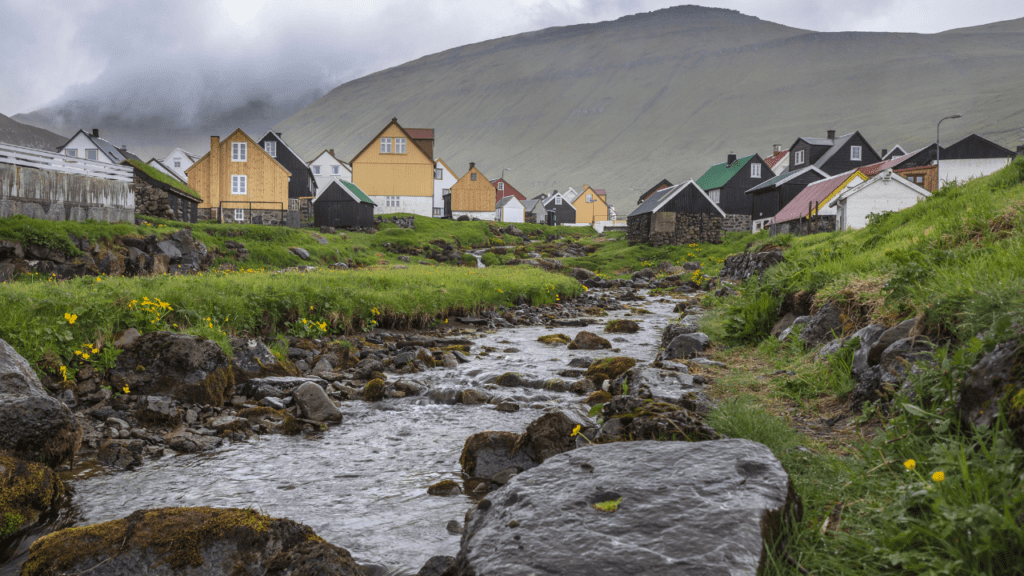
It is the second largest of the Faroe Islands. Eysturoy is yet again sprinkled with beautiful scenery and one unusual attraction, which involves getting to the island from Torshavn. There are two routes you could take. One is a passage over the Nordskala Bridge. The other is a drive through the undersea tunnel outfitted with a roundabout and an art installation! The main attractions on Eysturoy Island are concentrated around two villages located opposite each other on the northern tip of the island.
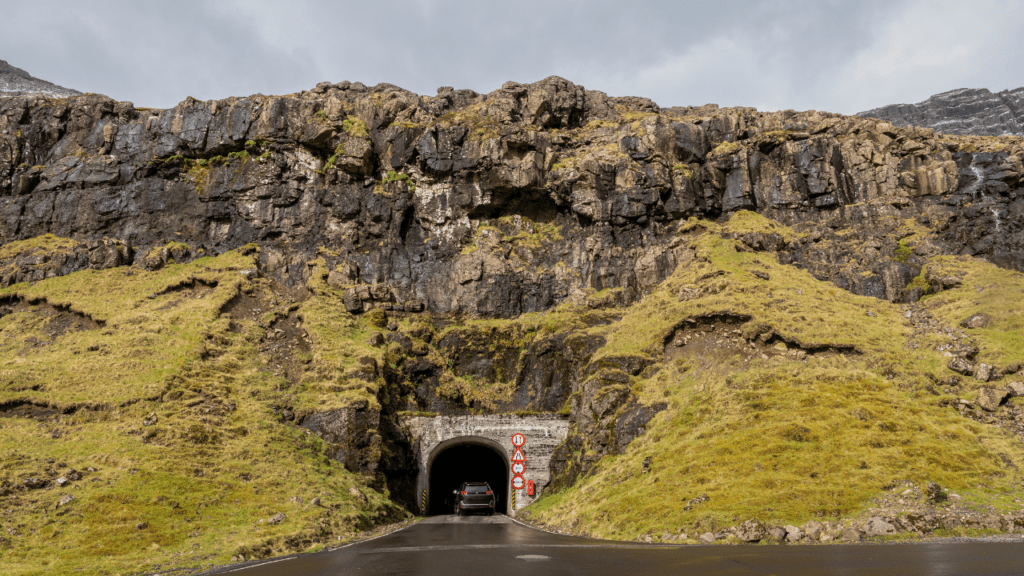
Eidi, the northwestern village, is as picturesque as the others and features an unusually located football field. Sitting between the calm lake and the foaming seashore, it is considered one of the most beautiful football fields in the world, which is now used as camping grounds. From Eidi you can hike the Eidiskollur trail to see Risin og Kellingin (Giant and the Witch), a pair of impressive rock formations that lie off the coast, and old World War II watchtower ruins.
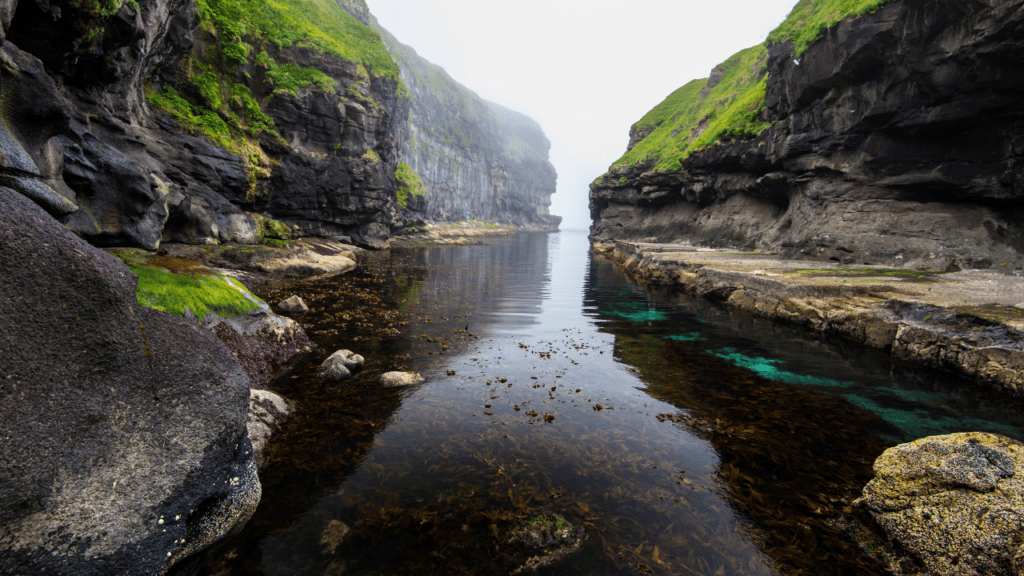
Crossing to the other side of Eysturoy, you will pass Slaattaratindur mountain. It is the highest mountain in the Faroe Islands, reaching 2890 feet in elevation. If you decide to climb the summit, make sure to start early. Go on a clear day to enjoy spectacular views of all the Faroe Islands in the distance. On the northeastern point of the island, you will find Gjogv. It is one of the best places to visit in the Faroe Islands. The tiny village competing for the title of the most picturesque sits right on a natural harbor. The best views of which are enjoyed from the cliff flanking the village on the left side across the famous gorge.
Kalsoy Island


The next island on our Faroe Island itinerary was Kalsoy. This is the one with arguably the best scenery if that can be possible. Kalsoy Island is home to the best hike in the Faroe Islands – the Kallur Lighthouse trail. We recommend starting early and heading to the lighthouse first. You can enjoy the scenery with nothing and nobody around the lonely lighthouse on the cliff. On the way to the lighthouse, you will also spot the famous James Bond gravestone. It was erected on the filming spot of the latest movie “No Time to Die”.
After the hike, finish your Kalsoy Island trip with a visit to Kopakonan, or the Seal Woman. The statue represents an old Faroe legend of selkies. To learn more about the Faroese myths and legends, including the Seal Woman, the Giant and the Witch, and more, check out this page from Visit Faroe Islands.
Of course, there are endless breathtaking sites peppered across the other islands that you should visit. By following Retirement Travelers Faroe Islands guide, you will experience the best of the archipelago. So, did you add it to your bucket list already?
The Faroe Islands Attractions Map
HOW TO SAVE THIS MAP:
Each icon has embedded information in the map, so click to review. To the right of the title of the map, click the ⭐️ STAR to save to your Google Map Account. To view it on your computer or phone, open Google Maps, click the three lines on the upper left, select “Saved,” select “Maps,” and this map will be listed below.
Best Time to Visit Torshavn, Faroe Islands
We have linked a great website to this button showing the weather for this location by the month. Click below to be taken to Weather-and-Climate.com.
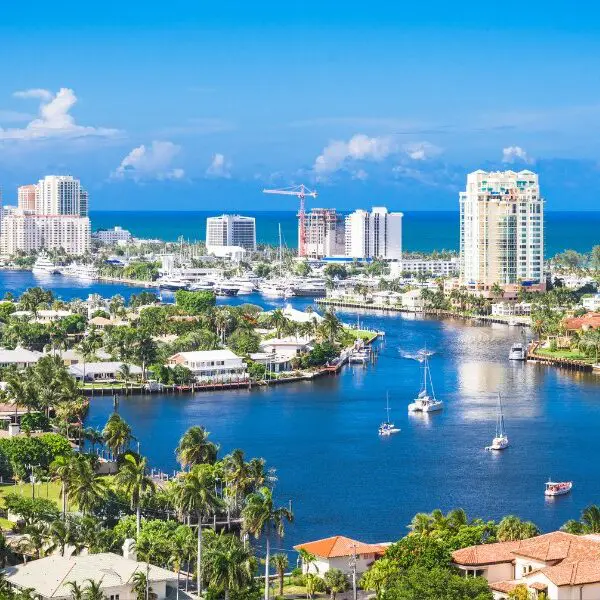
Leslie
Hi Guys!
We plan on visiting this amazing place in 2025. Can you tell us how many days you budgeted for your trip.
Thanks,
PS Great blog post!
Retirement Travelers
We were there for 8 days and loved it. What an amazing place. Let us know how it goes. Happy journeys,
John and Bev